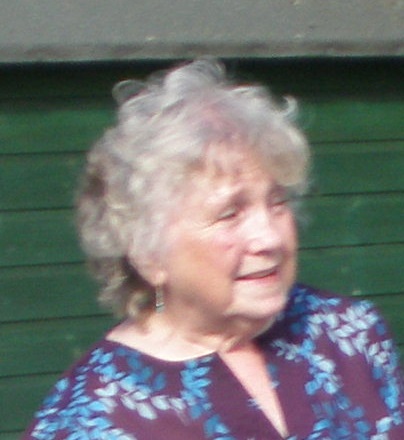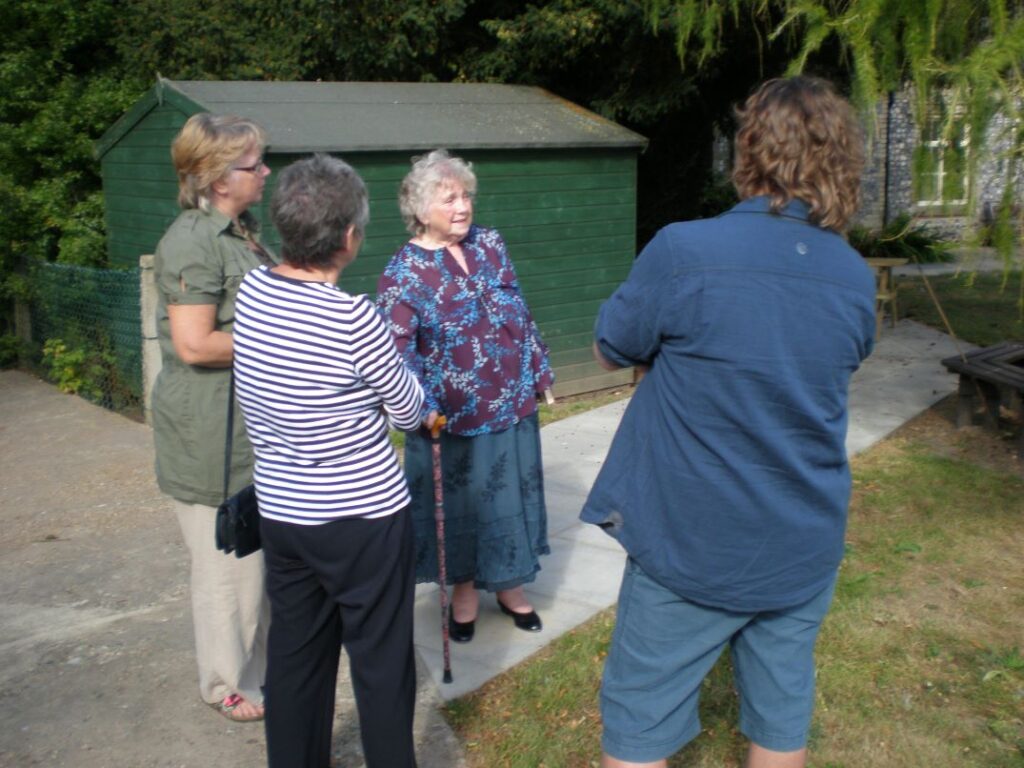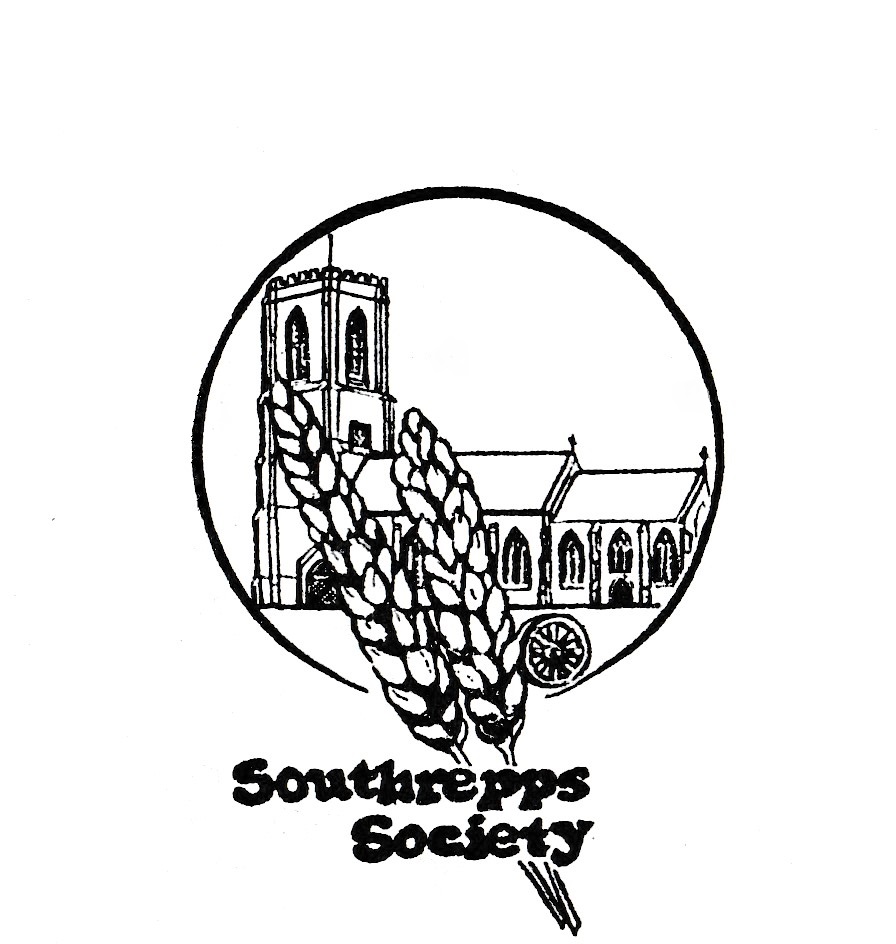
Reminiscences of Southrepps in the war by an evacuee
To and eleven-year-old girl in 1939 ‘WAR’ was a word without real meaning. My father had been torpedoed in the First World War, my mother lost brothers in France and talked of Zeppelins flying over London, but my concept of war was from history books-two lines of soldiers shooting it out across a distant field. Remember, we had no television to bring reality into our homes.
Breathing noisily in the gas mask drill was funny, and the bathroom being proofed against mustard gas was only a protective measure so that we wouldn’t be like the coughing veterans selling matches in Oxford Street. Having our dog put down was not funny, but necessary. Or so we thought from the warnings that air attacks would cause madness.
However my distress was distracted by thoughts of the new school I would be joining on the 4th September. I couldn’t wait to wear the smart navy tunic and square necked blouse, different to the gymslips and shirts of other schools.
It wasn’t until I clambered aboard a lorry in the early hours of Saturday 2nd September, that I finally realised I would not be going to Dagenham County High School. I was being evacuated and had no idea where my classroom would be. As we shuffled in the drizzle towards a paddle-steamer waiting at Dagenham Dock, I felt my mother’s fingers tremble, but we both attempted to control our tears. Surrounded by sobbing families it wasn’t easy.
The ‘Golden Eagle’ was packed with school children and mothers with babies, but my friends from Junior school were not on the steamer. So there I was, alone, in my heavy, damp coat, gas mask in a cardboard box slung around my neck, change of clothing and pack of sandwiches in a paper carrier, and the obligatory label pinned to my lapel. What to do now?
A small child attached himself to me, screaming as I roamed the decks, looking for his mother. Eventually a teacher rescued him, and I decided I would treat the journey as an adventure. Ships had always fascinated me, from the days when Dad had been a P&O steward. I rather enjoyed the little voyage.
At Great Yarmouth we were transported to a circular dance hall on the seafront. It is incredible that anyone managed to organise food and sleeping arrangements at short notice, for such vast numbers. During the evening, a talent competition was organised. The only song I could play on the piano was “Umbrella Man”, Flanagan and Allen’s big hit. Blankets and straw palliasses, smelling strongly of animals had been laid around the perimeter of the dance floor. Regardless of the pong, we soon fell asleep.
It wasn’t the siren that woke me, but a teacher, gently shaking my shoulder. She wondered if I would play ‘umbrella man’ to get people singing, in case they were nervous. Most of the evacuees were too exhausted to be nervous, let alone sing, and it was a false alarm anyway.
Next morning, coaches took us to our final destination, a village somewhere in Norfolk. My most vivid memory was when the driver stopped to buy newspapers, and I saw the placard. Its huge letters said WAR. That was the moment when I felt lonelier than at any time before or since.
My next clear memory is of being in a hall at Southrepps, waiting for someone to take us into their home. The strongest looking boys were quickly snapped up by farmers, no doubt fearing local lads would enlist before harvest was in. Eventually there were only two girls left, each dreading being the last. Fortunately, a kind family realised the situation and took us both, although they only had room for one. I think their name was Hewitt.
Joan Taylor, daughter of the Clerk to the Governors, was a third-year student. Like me she was an only child, so we found a kindred spirit and I was fortunate to be billeted with her. Fortune also favoured me with the Hewitt’s. True Christians in every sense of the word, they were the ideal family to cushion the blow of separation.
Our speech and background were totally different. Different, but not hostile. My council house in Rede Road had electricity, gas, running water and a bathroom; my father had worked at Woolwich Arsenal since leaving the Merchant Navy. The semi-detached cottage in Lower Southrepps had oil lamps, kitchen range, a pump in the back yard, and outside lavatory; Mr Hewitt ran a smallholding. Each morning he shaved with a cut-throat razor by the light of a candle before he tended his animals-chickens, ducks, pigs. The novelty helped cure the home sickness. I loved it.
My first task was to write to my parents and, a few days later, a large suitcase arrived and was eagerly opened. On top of my uniform, winter undies and wellington boots was a doll, with knitting pattern, needles and wool to dress her; music, a book, ‘Girl’s Crystal’ magazine, stamps, and a new Bible, which was smilingly noted by the Hewitt’s. Mum had read my letter carefully.
Most of the pupils were billeted in the Upper, larger village. Lower Southrepps was little more than a handful of cottages, chapel, and village shop, run by Mrs Hewitt’s mother, who also played the harmonium in the chapel. The Sabbath was a day of worship with Chapel twice and Sunday school in the afternoon. Knitting was taboo and only hymns to be played on the piano. Somehow it seemed in keeping with their way of life.
School was morning or afternoon only, alternating with the village pupils. There were insufficient books and materials, so it was fairly basic.
Three older boys were billeted next door and I think I was asked to join their friends so that the Hewitt’s would allow their daughter to come, supposedly to look after me. On one occasion we climbed a haystack and there was the usual high-spirited horseplay. I was very much on the fringe of the group, so much so that I disappeared over the edge, falling from quite a height on to my back. Badly winded, I thought I was dying as I struggled to breathe. I don’t remember being asked to accompany them again, but I do remember one of the boys was very concerned.
A more pleasant highlight was being allowed to ride a workhorse back from the fields. Country life was definitely for me, I decided. However after six weeks the threatened air-raids had not happened and my mother found separation too painful. I never asked how she felt when I wrote back to say that I was very happy in Southrepps, and didn’t really want to return to Dagenham, thanks all the same. Nevertheless, when she visited for the weekend, I couldn’t let her go home without me.

